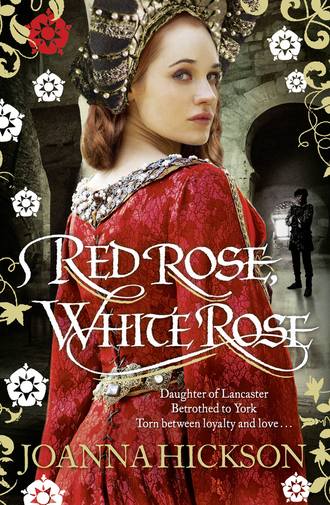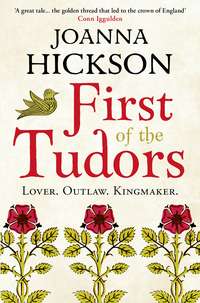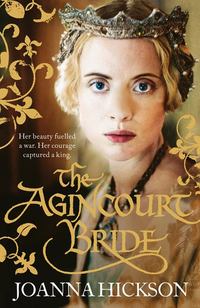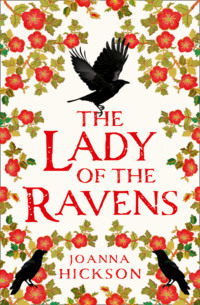
Полная версия
Red Rose, White Rose
I exploded with fury. ‘So this is your idea of chivalry, Sir John! This is how you help a lady in distress? I think your fellow knights would call it dishonorable extortion.’
He met my anger impassively, his expression veiled. ‘We shall see,’ he said coolly. ‘Some might say that extortion has been practiced on me and mine, rather than by me.’
I fell silent, still hostile but bereft of words. By now the industrious squire had removed all elements of the knight’s armour and gathered them up for removal and cleaning. Sir John stood in his doublet and hose but made no less an imposing figure, tall and lean with well-muscled shoulders and the powerful thighs of a man who could control a war stallion through day-long combat. He also had the air of one embarking on a venture with some relish, anticipating the challenge ahead. The squire returned with soft leather shoes and a blue, fur-lined gown which he proceeded to help Sir John put on.
Eventually I broke in with a request. ‘Perhaps the next time you send anyone to Raby they would inquire after my bodyguard. When last I saw him he was tackling a band of cut-throat reivers single-handed. I would be grateful to hear how he fared.’
Lady Westmorland’s response to this cut the air like a knife. ‘You show great concern for a servant, Lady Cicely. I wonder what my cousin would think.’
At first I did not follow her train of thought. ‘Your cousin? Oh, do you mean the Duke of York?’
The countess nodded. ‘Yes, your betrothed. Perhaps you did not know that I am Hotspur’s daughter and my mother was a Mortimer, like his. I wonder how happy his grace would be to hear you so excessively concerned for your bodyguard.’
I resented her implication. ‘Of course I am concerned!’ I cried. ‘It is my brother Cuthbert I speak of. I suppose I may show concern for a brother without offending against any code of conduct?’
Lady Westmorland’s lip curled. ‘Ah – the late earl’s unfortunate by-blow.’
‘Unfortunate!’ I echoed, incensed. ‘I am sure that even Sir John would allow that, illegitimate or not, Sir Cuthbert of Middleham is one of the finest knights on the Western March.’
I swung round to seek the knight’s endorsement but my use of Cuddy’s full name had touched a raw nerve in the countess. ‘Marie! Not just a by-blow but a Middleham by-blow. He certainly spread himself far and wide, your father.’
‘Enough!’ Sir John’s face had darkened; his grey eyes were narrow beneath knitted brows. ‘Let us speak no more of such things. Is there no refreshment for returning travellers, my lady? I am starving!’
The countess rose from her chair, her expression sulky, but she snapped her fingers at the servant who had been stoking the fires. ‘Go, boy! Fetch food and wine for Sir John.’
‘And for Lady Cicely,’ added her brother-in-law as an afterthought. ‘She will also need a bed somewhere safe, sister. I am sure that can be arranged.’
He had fixed the countess with a steely gaze and she held it for several seconds as if tempted to deny him but then nodded briefly and made for the exit to attend to his request. I wondered why she had no lower-ranked female companion to whom she could delegate such a task but supposed that none could stomach her sour disposition. Certainly I had no desire to be beholden to such an unpleasant hostess but although my stomach was rumbling with hunger I needed other bodily relief more urgently. As she passed by me I adopted a placatory tone.
‘Lady Westmorland, I have been riding since morning and would be grateful for the use of a guarderobe.’
I have an audible voice, low and clear, but to my consternation the countess made no acknowledgement and disappeared under the screen arch in a swirl of skirts. I felt my cheeks burn.
Sir John gave an apologetic cough. ‘My sister-in-law cannot have heard you. I will summon a female servant to show you the way,’ he said. ‘There will be refreshments when you return.’
Of necessity there is always a guarderobe or latrine off every great hall but I was not shown to one so close by. Perhaps being mainly for the use of visiting knights and their retinues it was not considered suitable for ladies. Instead a hatchet-faced serving wench led me two flights up a spiral stair built into the thickness of the wall, which ended in a small tower chamber bare of furniture but with a small guarderobe leading off it. Although I was used to an upholstered seat rather than cold wood, at least I could not complain about the latrine’s cleanliness. After making use of it I spent a few minutes attempting to remove the gorse twigs and prickles still stubbornly attached to my clothes and hair, observed with dumb curiosity by the servant, who made no attempt to help.
On my return to the hall I encountered an influx of young men, all seating themselves noisily at a newly erected and cloth-covered trestle-table. Among them I recognized Tam and the squire who had removed Sir John’s armour. Two pages stood by with bowls and napkins for hand-washing. There was no sign of Lady Westmorland but Sir John had been joined at the dais fire by a thin, pale-faced individual well wrapped in fur-lined robes and seated in a curiously constructed chair equipped with a foot-rest and slots for carrying-poles. I approached them hesitantly, unsure of my welcome.
‘Ah, here is our visitor,’ said Sir John, catching sight of me and beckoning me onto the dais. ‘Lady Cicely, allow me to present my brother Ralph, Earl of Westmorland.’
‘My lord of Westmorland.’ I made the required acknowledgement with little enthusiasm in either voice or curtsy.
‘Well, there is no disputing your Neville breeding, my lady,’ responded the earl, showing more amiability than his wife. ‘You are nearly as tall as John here.’
‘She is Lady Joan’s youngest,’ remarked Sir John.
His brother glanced at him sharply. ‘The Beaufort’s youngest?’ he repeated. ‘I thought that one had married the Duke of York.’ He made a seated bow in my direction. ‘You must forgive me for not rising, your grace. I am unable to trust my legs.’
‘She is not “your grace” yet, brother. That is a betrothal ring on her finger, not a wedding band.’
I glanced down at my right hand, where the big polished cabochon diamond glinted even in the gloom of the ill-lit hall. ‘I am not yet married, my lord, no. But I am surprised to hear Sir John call me a visitor. I believe hostage would be a more accurate term.’
‘Hostage?’ Lord Westmorland looked up at his brother, one eyebrow raised. ‘What does she mean, John?’
The knight shrugged. ‘I have sent word to her mother that she will be returned to Raby only when Middleham and Sherriff Hutton are yours.’
His brother held his gaze for several seconds, blinking slowly, before bursting into delighted laughter. ‘Ha! She is right, she is a hostage. I do not know how you came by her, John, but you have clearly made good use of your windfall. You are the pillar of my house, brother, indeed you are.’
This was too much for me. I cut through his offensive laughter with a voice like flint. ‘I would have expected honourable treatment from a man of nobility, my lord! But clearly I am mistaken.’
The earl reduced his mirth to a smile. ‘I see no dishonour in demanding ransom for a noble prisoner, Lady Cicely, and you are certainly that. Daughter of an earl, betrothed to a duke – and what do they call you in these parts? The “Rose of Raby”, do they not? Your mother’s favourite child. Oh yes, the dowager will give much to see you back safely under her wing. I believe I can look forward to taking possession of my rightful inheritance very soon.’
This mocking speech had brought me close to tears but I forced them back. I knew enough about the senior branch of the Nevilles to appreciate that life had not been kind to them. The stories of the present earl’s childhood accident – a fall from a horse which had weakened his back and gradually robbed him of the use of his legs – and the unfortunate death of both his parents within a year of each other were well known in the north-country, as was the vast discrepancy between the grand-paternal legacies to him and those to my mother. Also, not only had my father left the bulk of his estates to our side of the family, while enjoying a flush of royal favour in his later years he had secured marriages and titles of much higher rank for his second family than his first and the best match of all had been won for me. Richard, Duke of York was the richest nobleman in England and, having reached his majority in September of the previous year, had spent the intervening months establishing his claim not only to the York estates but also to those of his cousin Edmund, Earl of March, his mother’s brother, who had died without issue at about the same time as my father. Ever since I had known him, Richard had been looking forward with a fervent appetite to petitioning parliament for his vast inheritance and, if I am honest, I shared his eagerness, having desires and ambitions of my own. In that respect I was my father’s daughter and he had made a perfect match, for Richard of York was no prouder or more ambitious than Cicely Neville.
What the Brancepeth branch of the family did not know – at least I certainly hoped they did not – was that the day was fast approaching when Richard of York would come to Raby to claim me as his bride and it would be unfortunate to say the least if, when he arrived, I was not there to marry him. I could imagine the heated debate that would take place between my mother and those of my brothers who were available; the urgent necessity of my return balanced against their united determination not to cede one stone or acre of their inheritance to the other side of the family. I would doubtless have found it funny if the situation did not make me feel like a scrap of meat being fought over by snarling dogs.
3
Raby Castle
Cuthbert
My half-brother Hal paced the floor of Countess Joan’s salon, his face displaying anger and fatigue in equal measure. He had ridden through the night from his castle at Penrith to attend this family summit meeting, gathered twenty-four hours after Cicely had vanished off the moor and twelve since the ransom note had been received from Brancepeth.
‘You have indulged the girl too much, my lady mother, and this is the result.’
Only Hal dared to address the majestic Dowager Countess of Westmorland in such an admonitory tone. Her eldest son, the first of the thirteen children she had borne to the late earl, he was the only one to whom she deferred because he had inherited our father’s air of authority, though not his devastating charm or extreme height. Richard Neville, Earl of Salisbury, was known in the family as Hal for reasons that went back to the establishment of the Lancastrian dynasty at the turn of the century. Having been baptized in honour of King Richard the Second, who had granted my father both the earldom of Westmorland and the marriage to his cousin, Joan Beaufort, the name became an embarrassment when Henry of Lancaster forced King Richard to abdicate in his favour – and so the baby Richard Neville quickly became known as Henry instead, or Hal for short. However, by the time he came of age, the name Richard was no longer out of favour and he used it officially, but within the family Hal had stuck.
Nicknames seemed to haunt Hal though. At court, where he served on the king’s council, I had heard him called Prudence behind his back, because of his strategic and cautious approach to everything. It was my guess that had Hal been at Raby, Cicely would never have been allowed out on the moor to hunt so close to the date of her wedding.
Now his attitude was starkly pragmatic. ‘If Richard of York hears of this he will repudiate the marriage and then Cicely might as well go straight to the nearest convent. She will be damaged goods.’
Seated in her gilded chair beneath a baronial canopy embroidered with the Beaufort portcullis crest, the dowager countess looked weary and distracted, but she retained her composure in the face of her son’s anger. ‘None of our retainers will dare to breathe a word of it, even if they become aware of Cicely’s precarious situation,’ she said. ‘York will never learn of it as long as we can get her back before his harbingers arrive and that cannot be for two more days at least. What is your plan to gain her release, Hal?’
Her son gave an exasperated sigh and let his gaze sweep the assembled company. ‘You let her leave the castle, mother, and Will and Ned let her ride into the arms of reivers. None of you seems to have covered yourself in glory over the matter and now you call me in and expect me to wave a magic wand and sort out the mess. Well, it will not be that easy.’
I suppose I should have been grateful that I was excluded from his list of blame but I knew that did not exempt me from responsibility; rather it indicated that Hal did not recognize my right to be in the room, for Lord Salisbury was a stickler for rank and protocol. I was baseborn and in his eyes a bastard could never be considered of rank, even one who had been accepted into his family household as a child, was reared with his brothers, and had earned the accolade of knighthood during a campaign on the Western March toward Scotland, of which he was Lord Warden. Although we were brothers, Hal Neville and I were not exactly friends.
Anyway I did not escape entirely.
‘It was Cuthbert who told her to ride for Raby.’ This helpful remark came from Ned, the brother closest to Cicely in age and another whom I did not count among my supporters. ‘Otherwise she would not have become separated from the rest of us.’
‘Cuddy was obeying orders,’ Will Neville cut in, the only one of my brothers who used Cicely’s nickname for me, a man on whom I could always rely to take my part. ‘Do not try and blame him for our mistakes. The reivers should never have got so near us. We should have kept scouts out all the time, not called them in when the hunting started.’
‘Dogs cannot flush out birds while scouts are tramping all over the moor,’ protested Ned. ‘There would be nothing there to hunt.’
‘Oh stop bickering!’ cried the countess, fixing Ned with pale-blue eyes narrowed and glittering with unshed tears. ‘The whole world knows that Cuthbert would die for Cicely. He is as distressed as any of us by her perilous position. Nor can we lay all the blame on Sir John Neville because it was he who rescued Cicely from the reivers. Had he not, her fate might have been even worse. No – if we are fixing blame we need look no further than the man who unfortunately bears the title your father worked so hard to achieve.’
Countess Joan used an exquisite lace kerchief to dab her cheek where a single tear had escaped her control.
‘You are right sans doubte, Madame ma mère.’
Young Ned had pretentions of grandeur and often used outdated Anglo-French phrases in order to stress the ancient Neville connection with the conquering Normans who had subdued England four hundred years ago. The rest of us were content to use English, the only language commonly understood and spoken by everyone in the north.
‘The devil twists a body which contains a twisted mind,’ Ned persisted. ‘We should attack Brancepeth with all force before that son of Beelzebub takes it into his warped mind to send a ransom demand to Richard of York. That would ruin Proud Cis’s prospects for certain!’ Despite his call for instant military attrition, Ned also sounded positively gleeful at the idea of Cicely being rejected by her wealthy bridegroom.
Will was indignant. ‘Neville cross swords with Neville? No! That is a recipe for disaster. Besides, Ned, there is no reason why anyone should have a warped mind simply because his body is not perfect, or vice versa. My Jane may be feeble-brained, but she is the most kind and loving of females.’
Will’s wife was Jane Fauconberg who, when she married him at sixteen, had literally been a childlike bride with the mind of a girl of six. Nevertheless she had brought him, an otherwise impecunious and untitled younger son, the extensive Barony of Fauconberg. Those who objected that the marriage was distastefully mercenary and wholly against nature were confounded by the affection and care Will displayed towards his spouse and her clear love for him. Love had been rewarded, and their marriage was confirmed as legal and consummated when she recently became pregnant with their first child at the start of the year. Needless to say, Will was hoping for a healthy boy to inherit the barony, having already proved his own ability to father sons by siring two with his resident mistress.
Ned was scornful. ‘You are as soft in the head as your wife, Will,’ he sneered. ‘Anyway, I say attack is the only option – preferably today.’
I waited to see which way Hal would jump. Surprisingly, for a man of the sword, he sided with Will and his mother. ‘I do not agree,’ he said firmly, turning his back on Ned’s angry glare. ‘We do not have to fear for Cicely’s honour or her safety. Westmorland and his brothers may be thorns in our side but they are not the monsters you paint them. It is our sister’s reputation we must protect. Richard of York will be keenly aware, as I am, that a young girl who has not been permanently under the protection of her mother or some other responsible female can be considered damaged goods. If he perceives Cicely’s abduction as a way to free himself from his obligation to marry her, the king’s council would support him because they are looking to strengthen England’s crucial alliance with Burgundy. A marriage between a scion of Burgundy and an English royal duke would re-point its masonry.’
He moved nearer to the countess’s canopied chair and knelt down before her in the guise of an earnest appellant. ‘We cannot allow that to happen, my lady mother. Although I know you remain sensitive in the matter, I think we should appeal to Eleanor to intervene. She must surely have considerable influence with Lord and Lady Westmorland.’
Lady Joan’s face set in an icy stare and her knuckles grew white on the arms of her chair. Strictly speaking, she was no longer required to wear mourning for her late husband but, by payment of a hefty sum to the royal exchequer, she had obtained permission to remain unmarried and she still favoured widow’s weeds. In her gleaming black minerva-trimmed gown, relieved only by the high neck of her white linen kirtle and veil, she resembled an affronted abbess about to address an offending novice.
‘No, my lord, under no circumstances! Eleanor made her bed with Percy and she must lie in it. I have nothing to say to her.’
Eleanor Neville, the eldest daughter, had eloped at sixteen with one of the Raby henchmen esquires, to be married by a hermit-priest in his cell deep in the Northumbrian borderlands. In a romantic turn of events it transpired that the apparently humble squire was, in fact, Henry Percy, heir to the earldom of Northumberland, who had been living incognito ever since his father and grandfather had forfeited their titles and estates by rebelling against the first Lancastrian king, Henry IV. Young Percy had wooed and won his lady in a fashion which might have thrilled a troubadour but had horrified and offended Lady Joan, who had never forgiven Eleanor, notwithstanding her chosen swain proving to have a status equal to her own. Family pride had induced the countess to intercede with her nephew, the newly crowned King Henry V, to get the young earl reinstated, so that her daughter could at least obtain the rank to which her birth entitled her, but the unforgiving dowager had never again set eyes on her runaway daughter, nor on the seven grandchildren Eleanor had provided her with.
Now she reinforced her objection. ‘Besides, as I understand it there is little love lost between Lord Northumberland and his sister, the present Lady Westmorland. She too disliked the manner of his marriage. I doubt if they communicate.’
Salisbury rose from his knees and stepped back speechless, merely shrugging his shoulders with a sigh.
‘So much for family loyalty,’ commented Ned with a grin. He made a sketchy bow in the direction of his mother’s chair. ‘If that is the best we can do I will take my leave. Cicely had better take her future into her own hands for it is apparent that no one here is going to bend over backwards to help her.’ He tossed a withering glance in my direction. ‘Least of all her much-vaunted champion, Cuthbert.’
I bit back a retort as the countess rose, indicating that as far as she was concerned the meeting was over. ‘At least we can pray. I shall be in the chapel and do not wish to be disturbed unless there is an emergency,’ she said, sweeping her dark skirts around her feet and heading towards her privy door, trailing a drifting fragrance of attar of roses in the air and causing an ornate heraldic banner to billow on the wall. The banner quartered the red rose of Lancaster with the Beaufort portcullis and was bordered in blue and white; her own personal standard.
Lady Joan made a small gesture as she passed me, indicating that I should follow her out but before closing the door behind us I heard Ned remark dryly, ‘Praying is all she will do. There will be no property concessions, that much is certain.’
The private chapel at Raby was a small gem. Intended only for the use of the Neville family and their distinguished guests, it had been built by the old earl’s father, but Ralph Neville himself had commissioned the colourful frescos on the walls which celebrated the family’s rise to power. On an azure sea sailed the three-masted ship from which Admiral de Neuville had commanded the fleet which brought Duke William’s force from Normandy to invade England; beside that a scene of knights and archers in close combat depicted the famous Battle of Neville’s Cross, when the Scottish king had been taken prisoner on the moors outside Durham; and finally there were scenes showing masons working on the soaring walls of Raby castle, confirming the establishment of the Nevilles among the premier barons of England. At the chancel end of the nave stood a beautiful rood screen carved from Ancaster alabaster and adorned with images of local English saints especially revered by the family; St Cuthbert, St Hilda, St Aidan and St Godric.
Lady Joan led me down the nave and paused by the screen. ‘You were named for St Cuthbert,’ she reminded me, ‘but my lord’s favoured saint was this one, Godric the crusader.’ She laid her hand on a fold of the saint’s stone robe. ‘A few weeks before your father died he brought me here and, despite his pain, he managed to kneel before this statue, though his wounded leg stuck out like a broken branch. Then he prayed aloud, asking the saint for guidance but I knew he was really consulting me.
‘“The surgeons want to cut off my leg,” he said. “You fought the devil, Godric. Standing waist high in the waters of the Wear, you battled the Anti-Christ for a day and a night. Tell me, God’s stalwart soldier, what must I do to combat Satan’s demons that fester in my leg?”’
The countess turned away from the screen and addressed me directly. ‘Ralph did not have the strength to continue and I finished the prayer for him. I begged St Godric to allow my lord to remain a true knight, proud and upright and to carry his sword in Christ’s name. Not to let him stand before God a cripple.’
‘Oh, my lady,’ I croaked, shocked to hear that word applied to the father I revered. ‘What did my father say?’
‘He understood. He smiled at me through his pain and said, “So be it. I am sixty-two. I have lived my life. I will go to the Creator as He made me, with every limb intact. It shall be as it shall be. May St Godric give me the strength to bear it.”’
I stared at her, bewildered. ‘You believe that cripples are the devil’s acolytes? That the present Lord Westmorland is a disciple of Satan?’ I asked.
‘Yes. But I believe he can be confounded by a miracle. There was no miracle for my lord Ralph but I will pray for one for Cicely.’
With that Lady Joan went to kneel down at the plush prie Dieu which had been specially placed for her in the chancel beneath an image of Our Lady. I hesitated, wondering why she had required my presence but all became clear when she began to pray aloud. ‘Holy Marie, Mother of God, be with my daughter Cicely in her hours of trial. Show her the way to escape her captors and let there be a strong hand to help her when your miracle has been fulfilled.’






